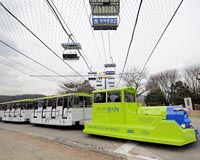 |
Tokyo (AFP) March 15, 2010 Four Japanese auto giants and the country's largest power company joined forces Monday to set up a common system to recharge electric cars, with the aim of creating a global standard. The growth of the electric vehicle sector has been hampered by the chicken-or-egg question of what should come first: zero-emission cars or the networks of recharging stations to keep them on the road. Toyota, Nissan, Mitsubishi Motors and Fuji Heavy Industries have linked up with Tokyo Electric Power Company (TEPCO) as the organising members of the new grouping called "CHAdeMO". The name is derived from a combination of the words "Charge" and "Move" and a pun on a popular Japanese phrase. In total 158 companies and government bodies are members, including 20 foreign firms, among them Bosch, Peugeot SA and Enel SpA. Standardizing charging infrastructure is vital to making electric vehicles popular, TEPCO chairman Tsunehisa Katsumata said. "We need to make this protocol a standard protocol outside of Japan," he told a gathering in a Tokyo hotel. Zero-emission cars are gaining traction globally as concern has grown over pollution from the exhaust pipes of conventional petrol cars and its impact on the environment. Mitsubishi Motors last year rolled out the i-MiEV and Fuji Heavy the Subaru Plug-in Stella, both in Japan. Nissan is set to launch the world's first mass market electric vehicle, the Leaf, later this year. Toyota, which has focused on hybrids, has promised to launch its own version by 2012. It has already begun leasing a plug-in hybrid electric vehicle since late last year, one year earlier than initially planned. Electric cars still face key hurdles such as costly batteries and the lack of conveniently-located recharging points, which limits their operating radius. Standardisation would require all makers to agree on the kind of outlet and the voltage, which currently differ among firms. "It's like establishing a common operation manual or a code that allows the charging machine to work across a broad range of electric vehicles," said Takafumi Anegawa, electric vehicle manager at TEPCO. The Japanese government is throwing its support behind the move, and has earmarked 12.4 billion yen (13.7 million dollars) in the budget for fiscal 2010 starting in April to develop a recharging grid. Some officials pointed at hurdles in creating a global standard. "It will be a big and difficult challenge for the entire world to reach the same method" in charging EVs, Toyota managing officer Koei Saga said. "In the end, we may just need to adhere to the methods in each country."
Share This Article With Planet Earth
Related Links Car Technology at SpaceMart.com
 Seoul unveils electric vehicle
Seoul unveils electric vehicleSeoul (UPI) Mar 11, 2009 South Korea has unveiled what is considered the world's first commercial wireless electric vehicle. The online electric vehicle, created by the Korea Advanced Institute of Science and Technology, can run up to 24.8 miles per hour. Power strips, buried 1 foot under the surface and connected to the national grid provide electromagnetic power to the OLEV, wirelessly, charging an on-board b ... read more |
|
| The content herein, unless otherwise known to be public domain, are Copyright 1995-2010 - SpaceDaily. AFP and UPI Wire Stories are copyright Agence France-Presse and United Press International. ESA Portal Reports are copyright European Space Agency. All NASA sourced material is public domain. Additional copyrights may apply in whole or part to other bona fide parties. Advertising does not imply endorsement,agreement or approval of any opinions, statements or information provided by SpaceDaily on any Web page published or hosted by SpaceDaily. Privacy Statement |